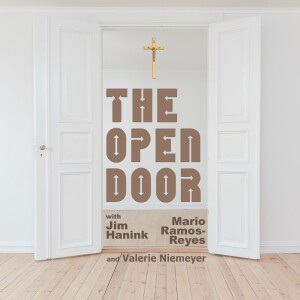
Episode 272: Dr. Matthew Minerd on the art of translation, Eastern Catholicism, Thomism & Ressourcement Theology, Part 1 (November 15, 2023)
 2023-11-16
2023-11-16
Download
Right click and do "save link as"
This week on The Open Door (November 15th), panelists Jim Hanink, Mario Ramos-Reyes, and Valerie Niemeyer discuss the art of translation, Eastern Catholicism, and the relation between Thomism and Ressourcement theology. Our special guest is Professor Matthew Minerd. He is a Ruthenian Catholic, raised Roman Catholic in a mixed American-Slavic and Appalachian cultural context in Southwestern Pennsylvania. Minerd is a husband and father, a seminary professor, and a translator.
view more
- You have become, in recent years, a distinguished translator. How did this come about?
- Some say that to translate is to betray: Traduttore, traditore! It’s a provocative charge, but could it be that where there is smoke there is fire?
- Is the art of translating a kind of interpretation? Does it involve compromises
- You are an Eastern Catholic and teach in an Eastern Catholic seminary, Ss. Cyril and Methodius. What do Western Catholics especially need to know about the Eastern Catholic heritage? How does it serve the Universal Church?
- Do you have any distinctive challenges in presenting Thomism to Eastern Catholics?
- How are you working to resolve the tension between Thomism and the Ressourcement of the Nouvelle Théologie?
- Reginald Garrigou-Lagrange has been dubbed “the sacred monster of Thomism.” Your recent translations of his books are Thomistic Common Sense: The Philosophy of Being and the Development of Doctrine, The Order of Things: The Realism of the Principle of Finality, Philosophizing in Faith, Essays on the Beginning and End of Wisdom, and The Sense of Mystery: Clarity and Obscurity in the Intellectual Life. What is your own assessment of Garrigou-Lagrange?
- Some speak of Jacques Maritain as the single most influential Thomist of the last century. You are active in the American Maritain Association. Where do you see the spirit of Maritain active today?
- Maritain was deeply engaged in the politics of his time. Does Thomism offer a foundation for constructive politics?
- What are some of your current projects?
More Episodes
012345678910111213141516171819
Create your
podcast in
minutes
- Full-featured podcast site
- Unlimited storage and bandwidth
- Comprehensive podcast stats
- Distribute to Apple Podcasts, Spotify, and more
- Make money with your podcast
It is Free
- Privacy Policy
- Cookie Policy
- Terms of Use
- Consent Preferences
- Copyright © 2015-2024 Podbean.com





